Introduction
I have noticed that a few of our posts are getting more traction than others. Frankly, people are getting rather triggered these days. This is something we absolutely understand and empathize with, as each of us face content, on and off this blog, that causes us to completely re-examine our perspective and shift our paradigm. I know that I have been in your shoes too, once or twice.
Two Requests
Let us avoid name calling. I understand that some comments can really cut deeply, but let us try to see things from others’ points of view. Calling other people rude names and belittling them does not make your case. In addition, one word that we could really do better without in this conversation is “divisive.” I truly believe that word is a silencing tactic for anyone would speak up about dissenting issues in the community: child molestation, colourism, domestic violence, the whole nine yards.

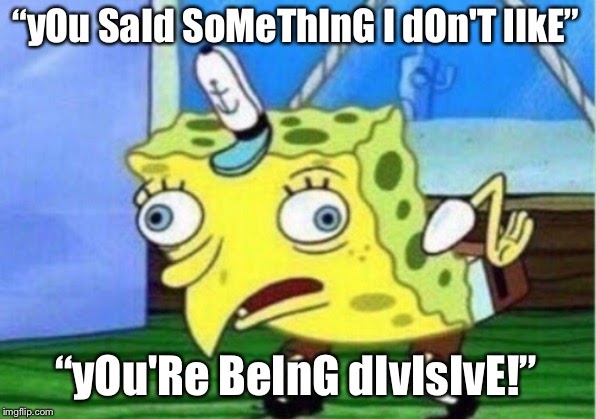
We see it time and time again – Black women raise specific issues in the community for discussion, and those conversations are shut down to benefit the greater good. People start telling us, “Stop being divisive! How does this benefit the community as a whole? Focus on the bigger/real issues!” Everyone else gets to benefit, except black women. We must always be silent about the issues that affect us, to assuage the emotions of everyone else, and to put on a united front. I will let you in on a little secret: you all are not fooling anyone. They can see your real face, oh.
On the blog, we want to introduce issues that impact us as a whole. We at Beyond Black and White love our audience, and hope that our posts encourage you to think freely, challenge the ideas you take for granted, and grow as a person. A plant cannot truly bloom without sufficient pruning. And if this short commentary does not soothe your bruised feelings, I would recommend a post on being offended as an excellent follow-up article.
My Thoughts
What are my thoughts on the concept of “black” versus “biracial?” Personally, I have always thought of the two as different, but similar. I always been fine with biracial people identifying as black, all the while knowing that there was a difference, and that there is potential for completely different experiences between them and me. Typically, if someone has a biological black parent, and I see that they have an appreciation and understanding of blackness and black culture, I have no problem calling them “black.”
(I personally will acknowledge quadroons and octoroons on a case-by-case basis. Do not even come for me about the use of those terms, when people are literally fighting for the continuation of the one drop rule.) I admit that my definition of blackness is rather loosey-goosey. That said, I am looking at these racial issues from a Canadian context. While race is an issue here, it is magnified in the United Kingdom by the power of ten and in the United States by the power of one hundred. As things have been rather comfortable here, I have allowed myself to be comfortable in my personal standard.
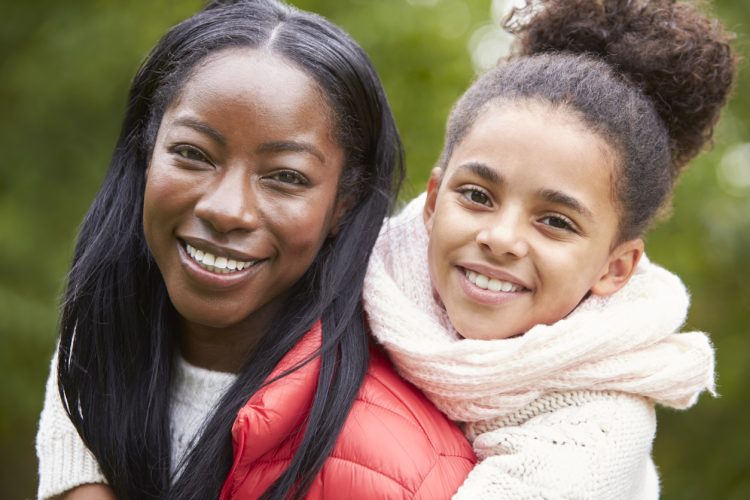
While black and mixed-race were once considered one group in the past, and that categorization mutually benefited each group, I do not see those same advantages being realized today. In our present time, biracial people have the luxury of flourishing in either or both identify they choose. I believe that any mixed-race person has the right to celebrate all facets of their identity. Now that Nic has introduced the topic, it makes me think more deeply about it. Let’s be frank, the goal post keeps changing for blackness. We have Kelani claiming she can say the N word because she is biracial. People have been arguing for Cardi B and Fat Joe to have passes too, as afro-latinos. Zoe Saldana figures she could just play Nina Simone, because, after all, we are all black. Julia Roberts has been rumoured to be an actress who could play Harriet Tubman. (I wish I was joking.)
Mixed-race women are worshipped in black popular culture. Black men are marrying lighter and mixed women, or dating outside of their race all together, which does not help black women who want to only date and marry black men. Any time a nonblack person has a hint of rhythm or speaks on black issues online, they get a pass from the Black Delegation and are invited to the cookout. These actions tell the public that blackness has nothing to do with race, ethnicity, shared history, or culture, but an analysis of physical characteristics and a mimicry of behaviours. If that is the case, we owe Rachel Dolezal, and every other blackface and/or cornrow-wearing person an apology.
I’m going to introduce an unrelated story and weave it into the content. There was a scene from The Incredibles that has always stuck with me. The villain, Syndrome, was angry that his hero, Mr. Incredible, would not let him fight crime alongside him because he had no superpowers, and was therefore not a superhero. The boy, then known as Incrediboy (or Buddy), had an amazing intellect and technological prowess, but Mr. Incredible didn’t want to take the risk. He grew up bitter and became Syndrome. He then starts taking out superheroes and building technology to sell to the highest bidder. As he revealed his plans to Mr. Incredible, he famously said, “When everyone is special, no one is.”
While defining blackness may seem divisive, it is a necessary conversation. I am sure that mixed race people have added historical and current value to black culture and the black experience, but distinctions must be made to address current situations. One cannot address and study issues facing breast cancer patients if we choose to highlight all cancer cases. (I am not calling anyone a cancer, I am comparing specificities and generalities though analogy.) With a continuously moving goal post, when everyone is black, no one is. Anywho, that is enough of my thoughts. I promised some of our audience that we would share their feedback from the original article as well. We had a thriving Facebook discussion, with over 400 comments and counting. I would like to do so now. Enjoy!
Audience commentary
We had a lot of feedback from our black, biracial and white female audience. Names and photos were removed from each comment, as I didn’t ask each commentator to share their name. Nothing else was removed. Order of comments were based on when participants expressed consent to use their comments.

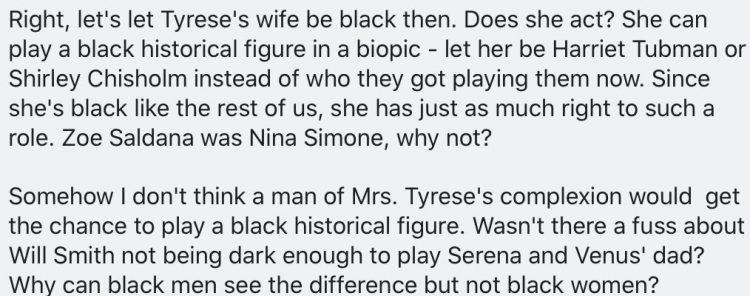












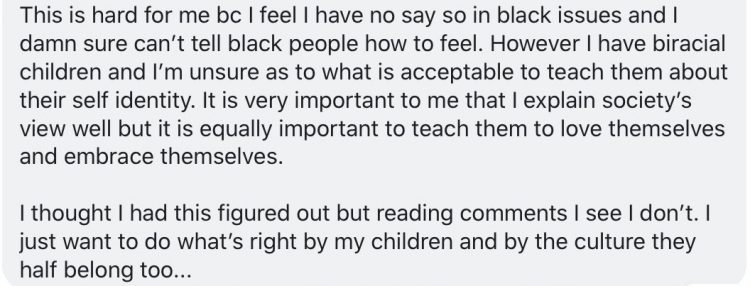
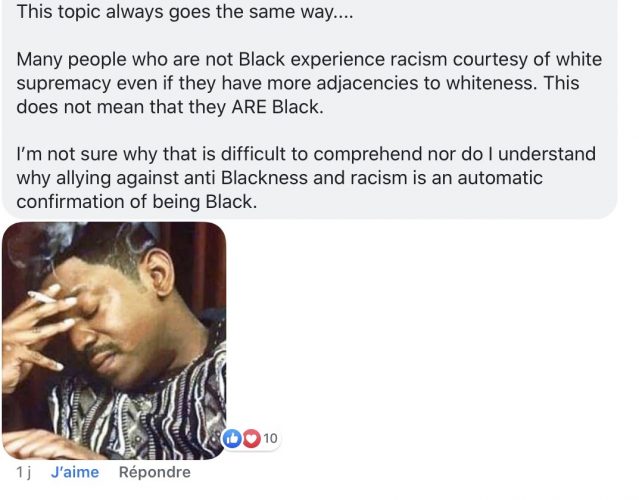
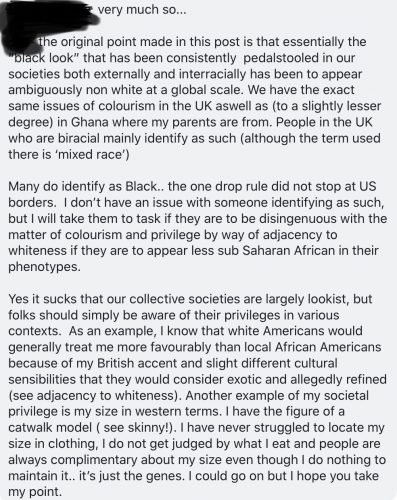
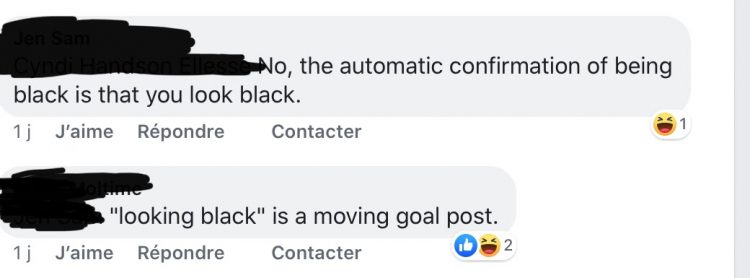
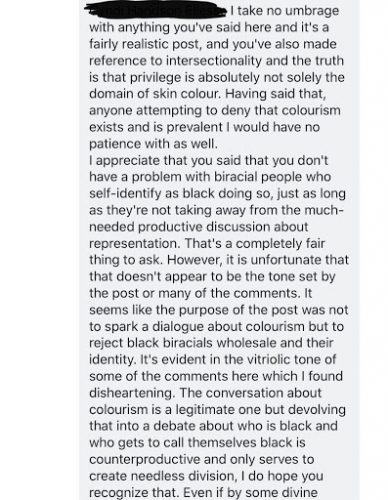
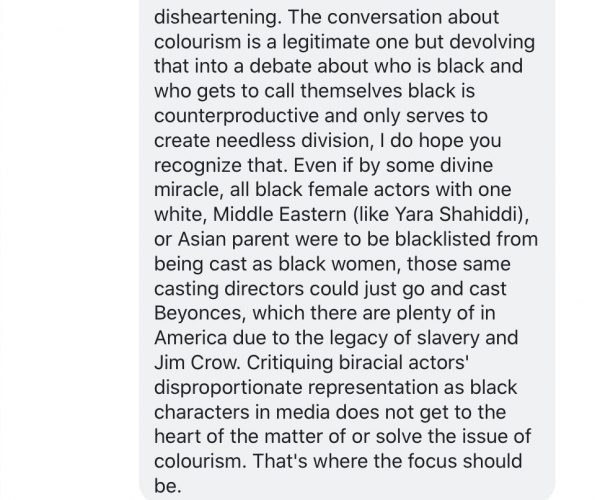

(I have included the photo below.)
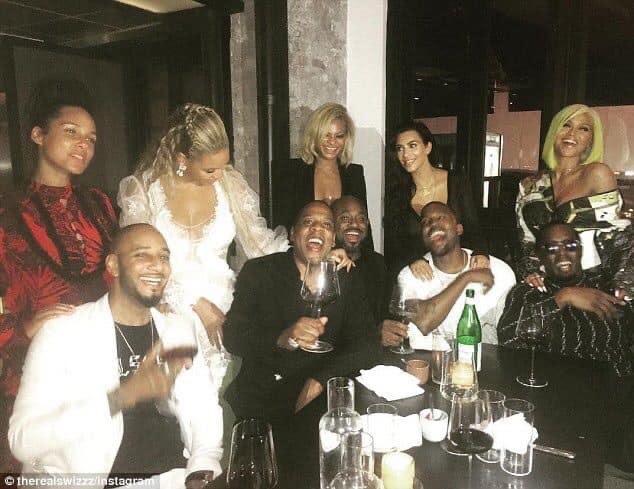

That is all for this post. I would have liked to have shared more dissenting views, but some of you were really wilding out in the comments section. We would love to continue this discussion in a positive and constructive way. I still think it is important for us to define blackness, who is impacted by this, and what is best for us as a collective. For more posts like this one, please subscribe to our website, or follow us on social media. We are on Facebook, Twitter and Instagram.